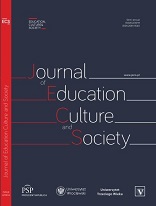Process Drama as a Method of Pedagogy in ESL Classrooms: Articulating the Inarticulate
Process Drama as a Method of Pedagogy in ESL Classrooms: Articulating the Inarticulate
Author(s): Sohaib Alam, Farhan Ahmad, Mohammad Rezaul KarimSubject(s): Social Sciences, Education
Published by: Fundacja Pro Scientia Publica
Keywords: Process drama;approach;method and technique;Productive skills;Grammar Translation Method;Drama in langauge learning
Summary/Abstract: Aim. The present study intends to explore how process drama can be effectively used and implemented in Indian classrooms. It further highlights the aspects of the conventional classrooms and discusses why Indian students are lacking in productive skills of the English language and how it can be diagnosed through using the theory and practice of process drama as an instructional method. Concepts/Methods. Data collection method through a questionnaire has been used in the study and SPSS version 20 is implemented to observe, analyze, and comprehend the data. Reliability and validity have been checked through a pilot study before using the questionnaire and the suggestions of an expert and responded were incorporated. Research Restrictions. The present study is limited to the Indian classrooms and especially the respondents were purposively chosen from undergraduate classrooms of different faculties. So it cannot be implemented thoroughly but the praxis of using process drama can be a potent strategy to teach English in ESL classrooms according to the level, background and nature of the learners. Practical Application. The findings of the study clearly indicate that the use of process drama in classroom pedagogy has a positive impact on receptive and productive skills of language. Cognitive value. The modern classroom pedagogy needs an approach of teaching which can foster the learning process easier and emphasize all four skills in an effective way.
Journal: The Journal of Education, Culture, and Society
- Issue Year: 11/2020
- Issue No: 1
- Page Range: 255-272
- Page Count: 17
- Language: English

